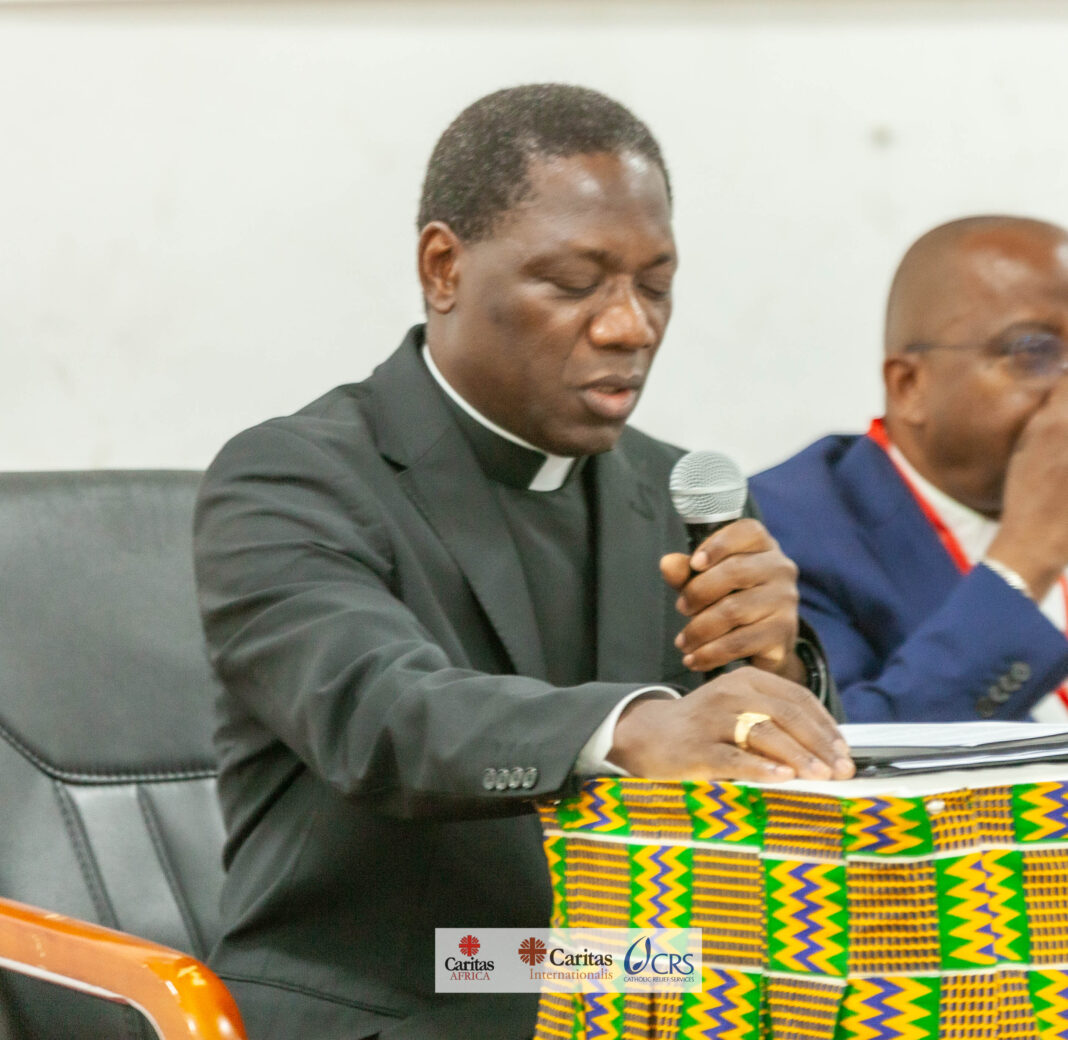The Apostolic Nuncio to Ghana, Most Rev. Julien Kaboré has stated that disasters, whether natural or man-made, present grave challenges to communities across the world, especially in Africa where vulnerabilities are often magnified by poverty, environmental degradation, and social inequalities.
He was speaking at the opening ceremony of a three-day Training of Trainers Workshop on Community-Led Disaster Risks Management for Caritas Directors and Technical Staff on Monday, December 2, 2024 at the Ghana Institute of Management and Public Administration (GIMPA), Accra.
The Nuncio quoting Pope Francis encyclical Letter Laudato Si, said “we are not helpless in the face of these challenges. Rather, this is a call to act with courage and creativity, working together to protect our common home and uphold the dignity of people.”
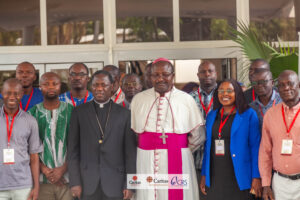
He assured the about 50 participants from the Regional Episcopal Conferences of West Africa (RECOWA/CERAO), the Association of Member Episcopal Conferences of Eastern Africa (AMECEA) and Madagascar and Episcopal Conferences of Indian Ocean (CEDOI-M zones) of the closeness of the Holy See’s encouragement, whose vision of an integral ecology inspires gatherings such as the workshop.
“This workshop is a practical embodiment of that call, as it seeks to empower leaders of Caritas organizations to develop community centred strategies for disaster preparedness and response,” Archbishop Kabore said.
The Burkinabe Nuncio to Ghana added that by equipping communities to take ownership of their safety and resilience, they were living out the Church’s mission of solidarity, subsidiarity and compassion.
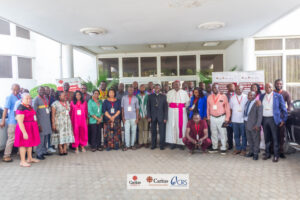
“It is also heartening to see how this initiative aligns with broader global and regional frameworks, such as the Together We campaign of Caritas Internationalis on Integral Ecology, Caritas Africa’s own Strategic Framework (2024-2030) and African Union Disaster Management Plan,” he indicated.
These alignments, he stated demonstrate the Church’s commitment to engaging constructively with civil society, governments and other partners for the greater good.
He encouraged the participants to approach their work not only with technical expertise but also with a pastoral heart, reminding them that disaster risk management is about restoring hope and dignity to those most affected.
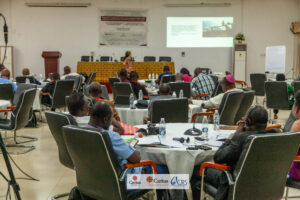
He, therefore, commended Caritas Africa and Caritas Ghana for organizing this vital initiative, and again, assured them of the Holy See’s support and encouragement.
He prayed that God would inspire and enlighten the participant’s discussions and make them bear fruits for many.
The Workshop was opened by the Most Rev. Gabriel Edoe Kumodji, SVD, Bishop of Keta-Akatsi and Episcopal President of Caritas Ghana.
Present at the opening were t Msgr. Pierre Cibambo, President of Caritas Africa; Ms. Lucy Esipila, Regional Executive Coordinator of Caritas Africa; Mr. Richard Akurugu, National Director of Caritas Ghana; Rev. Fr. Vitalis Chinedu Anaehobi, Secretary General of RECOWA.
Others were Very Rev. Fr. Clement Adjei, Secretary General of the National Catholic Secretariat, Accra; Rev. Fr. Edwin Terrence Adzimah, Acting Executive Secretary for Department of Human Development at the NCS; Rev. Michael Ackon Quaicoe, Director of Governance, Justice and Peace at the NCS.
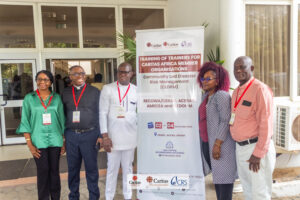
In his remarks, Msgr. Cibambo said the gathering of Caritas Directors gives a golden opportunity to increase their awareness and strengthen their capacity to fulfill efficiently and effectively the mission entrusted to them, always bearing in mind that “we are accountable to the people we serve, to those who support our work, to the Church and to God who hears the cry of the poor and the cry of the earth.”
He said reflecting and sharing about community led risk reduction could only help the participants become “even more what we strive to be: A Church organization with capillary presence in the communities, moved by faith and compassion, inspired by our rich social teaching and its values of human dignity, pursuit of common good, participation and respect for the principle of subsidiarity that gives power of action to the people themselves.”
He was hopeful that this training would equip them with the knowledge, and in particular the attitude needed to engage the communities and make them protagonists and be able to take their destiny into their own hands.
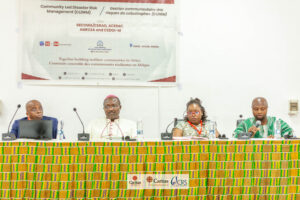
He emphasised that the role of participants was important as “it consists in accompanying them, which means to reach out to them, to be close to them, to understand their conditions, their culture, to be familiar with their coping mechanisms, to respect their know-how, to listen to their real needs, to journey with them, empowering them, equipping them with knowledge, technical capacity and so on, so that they may, at the end, take their destiny into their own hands. By doing that we contribute to building flourishing communities.”
On his part, Mr. Akurugu, Ghana’s National Caritas Director said “As Caritas organizations, our mission compels us to respond with compassion and action. However, our work must go beyond emergency relief; it must empower communities to lead their own preparedness and resilience-building efforts.”
This principle of community-led emergency preparedness, he stressed, is not only a priority for Caritas Internationalis and Caritas Africa but also forms a cornerstone of Caritas Ghana’s new Strategic Framework.
“We firmly believe that placing communities at the heart of disaster risk management ensures interventions that are both sustainable and attuned to local realities,” he stated.
According to the Caritas Ghana Director, “Through this framework, we are steadfast in our commitment to empowering grassroots communities to anticipate, prepare for, and effectively mitigate the impacts of disasters.”
This workshop, he noted was therefore, a significant step forward in achieving that vision, saying, “By equipping National Caritas Directors with practical tools, knowledge, and strategies, we are building a network of leaders who can drive this mission across Africa.”
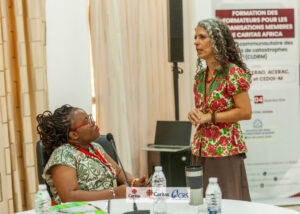
“It is our hope that the lessons and collaborations formed here will inspire transformative action in the communities we serve,” he added.
He opined that “The alignment of this initiative with the African Union’s Disaster Management Plan, Ghana’s Vision 2057, and Pope Francis’ encyclical Laudato Si’ reinforces the relevance of our efforts.”?
“Disaster risk management is not only about technical preparedness; it is also about safeguarding human dignity, promoting justice, and caring for our common home, he added.
By Veronica Sena Amenya//Newswatchgh.com

